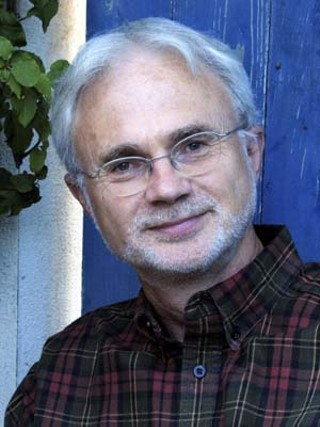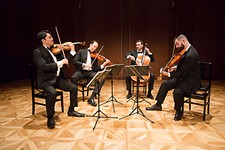Butler School of Music: For this John Adams, a King
UT honors the Nixon in China composer with an award for his notable musical work and three concerts featuring his compositions
By Robert Faires, Fri., April 25, 2008

John Adams' name is on everyone's lips these days, but if you think all the chatter is about Paul Giamatti in a tricorner hat, you haven't been inside the Butler School of Music at the University of Texas. There, the buzz is all about John Adams the composer, who will be at the school in the flesh this week as the latest participant in the school's Visiting Composers Series and the latest recipient of the Eddie Medora King Award for Musical Composition, an honor given to a composer with a distinguished body of work that comes with a $25,000 prize.
There's considerable cause for excitement. Of the many noteworthy composers brought to campus by this program – including previous King Award recipients John Corigliano, George Crumb, Chen Yi, and Joan Tower – Adams has had the deepest impact on the culture at large, one of the few composers in the last half-century who's known for writing contemporary concert music even outside the field. People who have not heard his work know of his operas Nixon in China and The Death of Klinghoffer, and his tribute to those who died on 9/11, On the Transmigration of Souls, earned him a Pulitzer Prize for music and a Grammy Award for Classical Contemporary Composition. In a profile for The New Yorker, gifted music critic Alex Ross called Adams "the most vital and eloquent composer in America" and said that his music, "unlike so much classical composition of the last 50 years, has the immediate power to enchant." It is "a cut-up paradise, a sequence of familiar elements arranged in unfamiliar ways. A gaudy Hollywood fanfare gives way to a trancelike sequence of shifting beats; billowing clouds of Wagnerian harmony are dispersed by a quartet of saxophones."
Naturally, the Butler School of Music is taking Adams' visit as an opportunity to play in that cut-up paradise. During his three days at UT (April 28-30), three concerts will feature Adams' compositions: the UT Symphony Orchestra on Monday, New Music Ensemble on Tuesday, and the UT Wind Ensemble on Wednesday. While the selections to be performed don't include any of his operatic or choral work (no Nixon, no Transmigration, and no Doctor Atomic – sigh), they otherwise provide a worthy survey of Adams' first 15 years of work: an orchestral work (the exuberant Short Ride in a Fast Machine), a work for orchestra and voice (the darkly lyrical The Wound-Dresser, a setting of Walt Whitman's Civil War poem), a solo piano work (the hypnotically minimalist Phrygian Gates), and a variety of chamber works (the serene Christian Zeal and Activity with its looping recorded preacher's voice; the frenetic, Looney Tunes-inspired Chamber Symphony; and the big-shouldered, pulsing Grand Pianola Music). It's that pulsing quality that appeals to New Music Ensemble director Dan Welcher: "There's always a sense of internal division. I love that and also his love of form." As Adams will attend rehearsals for all the ensembles, students will have a chance to hear insights into the pieces from the composer himself.
Adams' schedule also includes a master class in composition, a conducting seminar, and a lecture, which is open to the public (Monday, April 28, 4pm, in the Choral Room, Music Building). He will be presented with the King Award during the New Music Ensemble concert. See below for the concert programs; all start at 8pm in Bates Recital Hall. For more information, call 471-5401 or visit www.music.utexas.edu.
Monday, April 28
Symphony Orchestra performs Adams'
The Wound-Dresser (1989), plus Brahms' Piano Concerto No. 1 in D Minor and Ravel's Rapsodie Espagnole. Featured soloist: Anton Nel, piano. Gerhardt Zimmermann, conductor; Richard McKay, guest conductor.
Tuesday, April 29
New Music Ensemble performs Adams' Christian Zeal and Activity (1973), Phrygian Gates (1977), and Chamber Symphony (1992). Featured soloist: William Doppmann, piano. Dan Welcher, conductor.
Wednesday, April 30
Wind Ensemble with the Choral Arts Society, Concert Chorale, Women's Chorus, and Men's Chorus perform Adams' Short Ride in a Fast Machine (1986) and Grand Pianola Music (1982); plus Carmina Burana by Carl Orff. Featured soloists: Suzanne Ramo, soprano; Jeffrey Jones-Ragona, tenor; and William Lewis, baritone. Jerry F. Junkin, conductor, Wind Ensemble; James Morrow, conductor, Choral Arts Society; Suzanne Pence, conductor, Concert Chorale; James Henderson, conductor, Women's Chorus; John Wiles, conductor, Men's Chorus.










